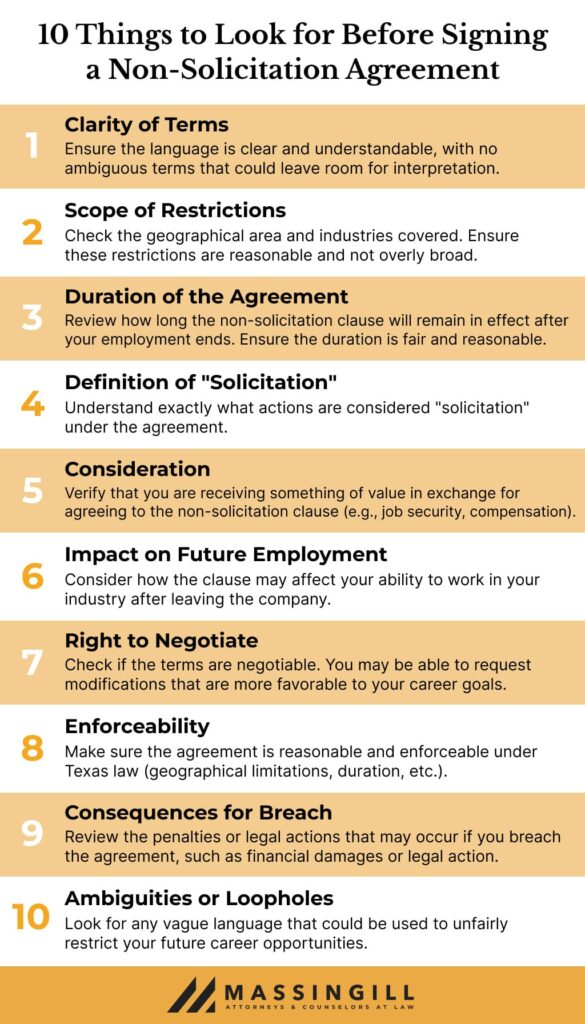
Once you accept a job offer, employers usually provide you with a stack of paperwork to review and sign. During the excitement of starting a new job, employees don’t always take the time to understand the terms and conditions of their employment contract.
Most employers include non-solicitation clauses in their contracts, but employees rarely take the time to truly grasp what those clauses could mean for them in the future.
Before you sign your employment contract, be sure to read through the terms and conditions. If you don’t understand them, ask your employer to clarify or work with a contract attorney to explain your rights and responsibilities.
If you’ve already signed your contract and are considering a new job opportunity, you might wonder, Are non-solicitation agreements enforceable in Texas? Non-solicitation agreements can be enforceable, depending on the circumstances and facts involved.
What Is a Non-Solicitation Agreement?
In Texas, businesses often use legal agreements to protect their company interests, such as trade secrets and client relationships. These agreements restrict or limit what employees can and can’t do and how they share business information. These are “restrictive covenants.” One common restrictive covenant is a non-solicitation agreement.
Non-solicitation agreements are designed to prevent employees from leaving the company and taking clients with them when they leave. They can also prevent an employee from soliciting other current employees to leave and start a new company.
Non-solicitation agreements also outline the geographical scope and duration of the limitation. These agreements are often used in conjunction with non-compete agreements.
Are Non-Solicitation Agreements Enforceable?
Non-solicitation agreements are enforceable in Texas, but their enforceability depends on the specific terms and circumstances of each case. Similar to non-compete agreements, non-solicitation agreements must meet certain criteria to be valid under Texas law. To be enforceable, a non-solicitation agreement must:
- Be ancillary to or part of an otherwise enforceable agreement
- Be supported by consideration (something of value)
- Be reasonable in terms of geographic scope, duration, and the extent of prohibited activity
- Be justified as a means of protecting the employer’s legitimate business interests
If the non-solicitation agreement meets these requirements, a court is more likely to enforce it.
Case law addresses the reasonableness of a non-solicitation agreement’s scope, duration, and geography. This analysis is fact-specific and determined on a case-by-case basis.
For a non-solicitation agreement to be enforceable, it must be drafted clearly and carefully. Courts will consider the specificity of the language used, the circumstances under which it was signed, whether the language is unambiguous, and whether both parties entered the agreement willingly.
Non-solicitation agreements that are overly broad or unreasonably restrict an employee’s ability to pursue their career may not be enforced. In some cases, a court may modify or nullify such an agreement.
What Are the Consequences of Breaching a Non-Solicitation Agreement?
If you breach a non-solicitation agreement, your employer may take legal action against you. Before pursuing litigation, the employer may send a demand letter, requesting that you cease activities that violate the non-solicitation agreement. This letter typically includes a deadline for you to confirm that you will stop soliciting clients or employees.
While the demand letter is not legally binding, it serves as a warning to avoid legal action and encourages the employee to comply, knowing that litigation could follow if they don’t stop violating the agreement.
If you continue to breach the non-solicitation agreement after receiving the letter, your employer may file a lawsuit. The primary remedy sought for breaching a non-solicitation agreement is often an injunction—a court order requiring you to stop soliciting or hiring the employer’s clients or employees.
In addition to an injunction, a former employer may seek:
- Compensatory damages—to recover lost profits caused by your breach, requiring proof of actual financial loss.
- Punitive damages—to punish malicious conduct, which requires strong evidence that the breach was intentional and malicious.
- Liquidated damages—some non-solicitation agreements specify predetermined amounts that the employer can recover if they prove the agreement was violated.
Typically, attorneys’ fees are not awarded for breaches of non-solicitation agreements unless specified in the contract.
If you are facing a potential breach of a non-solicitation agreement, consulting with an experienced contract attorney can help you understand the potential consequences and defend your case.
Call (512) 410-0343 or fill out the form below to speak with our experienced contract attorneys

Should You Sign a Non-Solicitation Agreement?
Determining if you should sign a non-solicitation agreement depends on the language of the clause and if you think it could keep you from working in your current industry. Always consider your ability to make a living and if the contractual provisions would prevent you from doing so.
If you are having difficulty understanding the language of a non-solicitation clause or its implications for your particular situation, consider seeking legal advice.
Additionally, don’t feel pressured to sign immediately or sign it as is. You can take time to review it, get advice, and even negotiate the terms with your employer.
Let Massingill Review Your Contract and Protect Your Rights
Whether you are just about to sign a contract or you’ve already done so, let an experienced contract attorney review it with you. By working with an attorney, they can help protect your rights during and after your time of employment.
Massingill can review your contract, negotiate better terms, and advise you on defending against non-solicitation provisions. Our attorneys have extensive experience drafting, negotiating, and enforcing employment contracts and their various provisions. As a small Texas law firm, we can provide each client with individualized attention.
Our firm has received nearly 200 five-star reviews from satisfied clients for our superior service. We pride ourselves on fighting for your rights to work freely and earn a living. Contact Massingill today to learn how we can help with your non-solicitation agreement.
Where You Can Find Our Austin, TX Offices
Where You Can Find Our Abilene, TX Office


